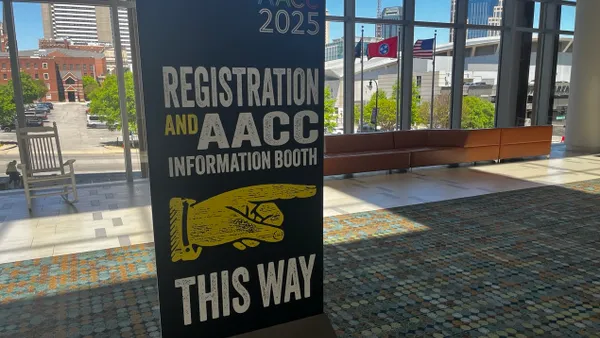Dive Brief:
- Louisiana's public colleges will no longer ask students to take remedial English and mathematics courses for which they won't earn credit following a state regent board policy change.
- Instead, students who need assistance in these areas will be directed into for-credit classes and receive more academic support, which the regents said will bolster retention and graduation rates.
- In early results from the 2020-21 academic year, first-year students enrolled in the new version of math classes passed more than half of the time, compared with only 11% who took the noncredit remedial course.
Dive Insight:
Remedial courses are those students must take to build their skills, traditionally in math or English, before they're allowed to take college-level classes for credit.
But they've been critiqued for costing students time and money, particularly students of color and those with low income. Research from 2012 indicated remedial coursework cost students $7 billion a year.
Colleges in swaths of the U.S., cutting across the political spectrum from Florida to California, have moved to eliminate remedial courses.
A Florida law took effect in 2014 making placement exams and remedial classes optional. It also required two-year colleges to replace remedial courses with credit-bearing developmental education courses. A 2019 study from the Center for Postsecondary Success at Florida State University found the changes boosted student success and narrowed equity gaps in credit attainment.
California State University, the nation's largest four-year public college system, discontinued the use of remedial classes in 2018 and placed first-year students in standard courses. It found that just after a single term, the number of underprepared students who earned credit, particularly in math, rose significantly.
In making the change in Louisiana, the regent board cited similar successes in Georgia and Tennessee. Louisiana was one of seven states in 2020 to receive a $300,000 grant from the Education Commission of the States, a policy organization, to retool its remedial courses.
"Today's action by the Board is a great example of putting our Master Plan objectives into play," board Chair Collis Temple III said in a statement Wednesday. "Addressing barriers to student success, like passing college-level math, gets us closer to our goal of doubling the number of credentials in our state by 2030 and at the same time saves our students time and money."
The board also approved new prior learning assessment guidelines that allow undergraduates to earn credit from experiences outside college, such as in the workforce or military.














